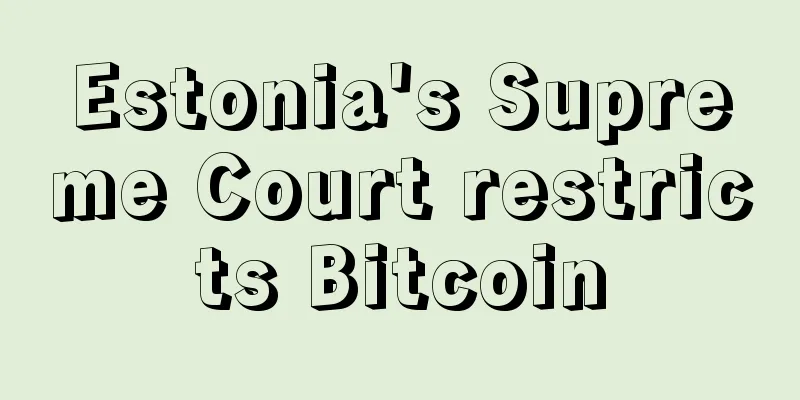Estonia's Supreme Court restricts Bitcoin

|
Trade has always been one of the main uses of Bitcoin. The fluctuation of the price of encrypted digital currency has always been used by short-term traders. Just when the flow of funds in Bitcoin trading was getting better and better, news of the government's review came out. As a result, the Estonian government officially became one of the countries that restricted Bitcoin trading. The Estonian Supreme Court has recently ordered that Bitcoin trading be included in the scope of anti-money laundering legislation. Once the decree is issued, it will become difficult for digital currency trading in the region. The decision concerns Otto, a Bitcoin entrepreneur whose Bitcoin trading platform BTC.ee was forced to close by law enforcement agencies. However, the Supreme Court’s action may not be helpful for the development of the Bitcoin ecosystem. The laws issued to regulate Bitcoin are outdated, and if digital currency transactions are supervised, Bitcoin will go the way of the fiat currency system. These laws are not necessary at all, and there is no need to regulate Bitcoin and other digital currencies. This will bring a series of problems to the Bitcoin ecosystem, such as stifling innovative technologies and discouraging the enthusiasm of emerging companies to build Bitcoin and develop blockchain technology. Instead, the Estonian government should develop more Bitcoin-friendly legal systems, which would not only create a better environment for digital currency businesses, but also make it easier for the government and regional financial institutions to benefit from it. BTC.ee 's troubles began in 2014 when it received an email from the Estonian Financial Intelligence Unit, a copy of which stated that Otto's Bitcoin-related business violated Estonian law. In the email, the government agency asked Otto to provide company registration details, anti-money laundering legal provisions, operating procedures functions as a financial institution, and customer identity documents. Otto's application to establish a Bitcoin exchange was rejected twice, once by the Tallinn Administrative Court and once by the Tallinn Circuit Court. Finally, the Supreme Court dealt a fatal blow. In order to set priorities and give Bitcoin a fair chance to develop in Estonia, Otto took up legal weapons to fight. But now it seems that he has failed. Otto hoped that the case would be transferred from the Estonian Supreme Court to the European Court of Justice, but he did not get his wish. Bitcoin has many uses waiting to be discovered, and placing it under an outdated legal system and restricting it is not a good thing for society. |
<<: Political hackers use Bitcoin to manipulate elections in nine Latin American countries
>>: Bitcoin and Multicoin wallet provider CoinWallet shuts down
Recommend
TKTS coin-new coin, a fork of Turtle coin trtl, a new coin in the Monero series
TKTS coin is a new coin, a fork of Turtle coin tr...
Analysis of the face of women with curved eyebrows: women with curved eyebrows are romantic
1. The physiognomy of a woman with curved eyebrow...
What does a woman's eight hands represent? Look at her left and right hands.
Different people actually have different palm lin...
Bloomberg: What the September rate cut means for the economy and the election
It’s finally time to cut interest rates. That’s w...
Bitcoin Mining Is Finally Profitable — Does This Prove We’re in a Bull Market?
According to economist and global market analyst ...
How to tell fortune in middle age through face reading? The relationship between face reading and fortune development
Destiny begins from the moment we are born. Fortu...
Short chin features
There is no identical face in the world, not even...
What is the secret of Yintang?
Many people often see fortune tellers on TV say t...
Still freezing? Ethereum Parity wallet vulnerability still exists, no easy solution yet
It’s been three weeks since $160 million worth of...
You can tell whether you have good fortune by looking at your face.
You can tell whether you have good fortune by loo...
What are the characteristics of a philandering woman?
Regarding philandering women, their facial featur...
Is it good for a woman to have a forward-tilted chin?
Some people think that women with a forward-tilte...
Dream Interpreter's Technique of Knowing People
<Yingyao Chapter> Dream Interpreter's T...
&lt;Kun Ma Chapter&gt; Praise for the accurate identification of people
The "Kunma Chapter", also known as the ...
Is it good for a man to have a fleshy nose?
Face and personality are closely related and influ...









